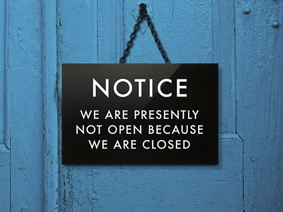Yesterday’s customers were future-oriented. “When can you get this to me?” they asked. Prices were fixed, customers came to you, and you had plenty of time to get an order out by the end of the week.
 Today, customers are more present-oriented. “I want it now” is a common refrain. Price transparency and instant delivery are the order of the day. Customized products and services built around customer needs, and on their schedules, are driving the customer relationship.
Today, customers are more present-oriented. “I want it now” is a common refrain. Price transparency and instant delivery are the order of the day. Customized products and services built around customer needs, and on their schedules, are driving the customer relationship.
Customers expect to be able to do anything they want, from anywhere and at any time. Why? Because they can–and they already do. Basically, customers want what they want on their schedules, not yours.
In many industries, this tremendously changes the expectations for what represents good customer service and what customer experience comprises.
Opportunities For Dramatic Change Exist For Most Companies
Not long ago, we completed a customer experience improvement program for a multinational insurance company whose business customers–mostly brokers–liked the idea of webinars, but simply couldn’t make the time, particularly when these brokers are scattered around the globe.
Turns out something as simple as archiving webinars for on-demand accessibility dramatically and unsurprisingly increased their effectiveness.
In another example, a major regional bank discovered that accessibility – defined as “interacting with my bank where and when I need them” – was the most important characteristic for any bank with their customers. Accessibility was more important than trustworthiness, accountability, and problem solving, to name a few.
Why? Because banking customers expect to do banking when they want, including off-hours, weekends, and evenings. As wonderful as the in-person branch relationships and phone-based service delivery were, trending analysis showed the bank was losing ground with their customers.
When we discovered this–and that competitors were much more effective than our client at remote-access touchpoints, such as ATMs and online banking–the client recognized a significant experiential gap that needed to be closed.
A great thing about improving customer centricity by “shifting time” is that understanding the associated opportunities is something almost any company can analyze and take immediate steps to improve. Insights like these abound.
Shifting Customer Service In A World Of Shifting Time
The fact is, we are living in a world in which customers can leverage digital innovation to shift time and space at will to meet their needs. Resisting these trends is dangerous for a company to do.
Yet, surprisingly, there are still many businesses where customer service and support is provided only during certain defined hours. For example, I am a customer of healthcare giant Roche, using one of its home-testing products. When my doctor suggested the service, I made note of the Web site, which boasted, “A new, easy-to-use application for healthcare professionals and their patients... With robust reports, online access, and comprehensive charts, [it] helps physicians and patients stay connected, while making reporting and tracking of test results more convenient.”
Ironically, its tagline appears to be “We Innovate Healthcare.” Ironic because as a smart customer, I’m utterly confounded by the fact that the Web site won’t allow customers to enter home-testing results unless its East Coast offices are open. If I log on after, say, 7 p.m. from my home in Northern California, or on a weekend, the Web site is closed. Seriously?
What about the consumer products company that offer technical support to customers around the globe, from 9-to-5, Pacific Time? Does the firm really expect that none of its products are installed or used outside of these hours? Or does it care so little about its customers that intelligently automated support options aren’t available?
For those companies that wish to serve smart customers, this doesn’t just mean that more people are going to be working the night shift (which it does). It also means that companies will need to leverage technology to diagnose problems, train customers, upsell services, and gather feedback–and act on it.
Time-Based Restrictions Will Disappear
Companies aren’t going to embrace the notion of “always open” because it suddenly becomes profitable to stay open 24/7. They’ll do it because when you compete with firms such as Zappos, which operates its warehouse 24/7 even though it’s not the most cost-effective way to do so, the notion of being closed will be suicidal from a competitive perspective.
Competitors like these–and more are popping up every week–recognize the value of delighting customers who order after midnight with a shipment that shows up on their doorsteps literally hours after being ordered can’t be measured by “maximized picking efficiency.”
They’re measuring the value of providing “...a WOW experience, which [their] customers remember for a very long time and tell their friends and family about.” And as we can attest from working with many organizations, the value of providing those “wow” experiences is both measurable and significant.
Of course, if you’re closed, your customers will have to go someplace else for those experiences. The good news for them is there’s almost certainly another company willing to give them what they cannot get from you–at anytime of the day or night.
-- Adapted from the book Smart Customers, Stupid Companies: Why Only Intelligent Companies Thrive, and How to Be One of Them, by Michael Hinshaw and Bruce Kasanoff (Business Strategy Press, 2012). Follow Michael and Bruce on Twitter, and visit them at SmartCustomers.com.

